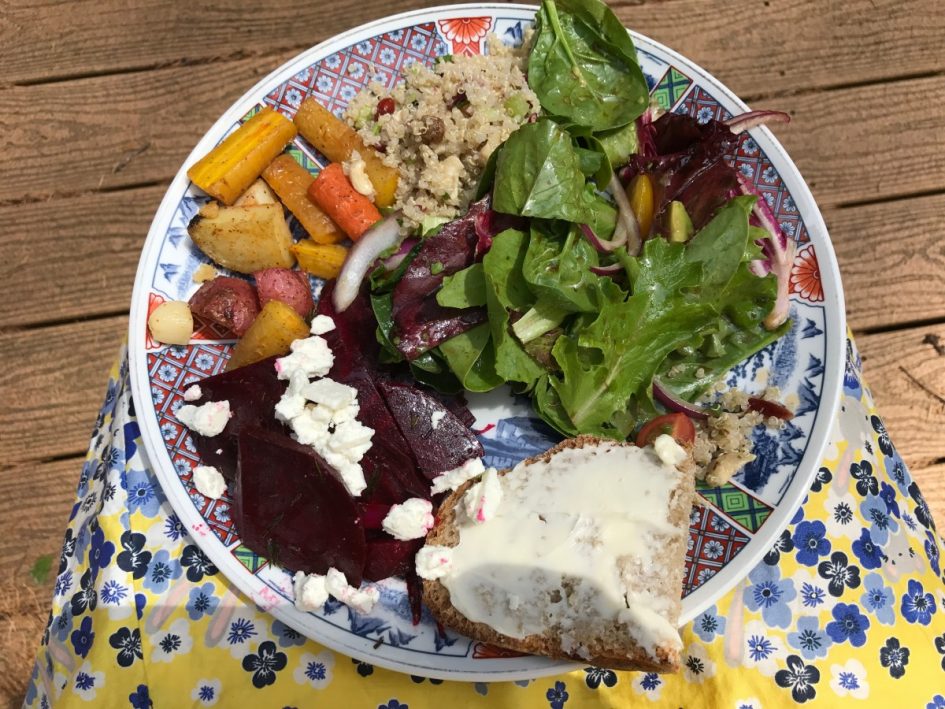Self-evaluation can be found here as a Google document, or copied below.
Faculty – Sarah Williams, Ph.D.
SOS – Commodification Processes and Alternatives
ILC – Flavor and Function: A Historical and Cultural Exploration of Food
In the spring of 2017, I had the great pleasure of exploring history and culture through food. I also worked with the Herbal Medicine Club to restore and put into use Evergreen’s Herb Garden. Additionally, I documented Patrick Merscher’s progress on the NOVIC tomato trial based on updates he sent to me and to faculty. Finally, I attended classes and seminars to discuss our many program texts, including Barry Estabrook’s Tomatoland, Vertamae Smart-Grosvenor’s Vibration Cooking, and J.M. Coetzee’s The Lives of Animals.
Within my ILC, I divided my learning objectives into several categories applying to the different projects I worked on. My first learning objective was to attend weekly class meetings on Tuesdays, participate in seminar and the associated writing assignments, present the current status of my project, and document my work through my WordPress e-journal. That was mainly achieved through writing about and reading assigned texts, participating in class, weekly tasting labs, and helping lead several seminars. Through my WordPress e-journal and my weekly seminar papers, I documented this work.
My second learning objective was to post the updates sent to me by Patrick Merscher on the NOVIC Tomato Trial on my WordPress e-journal to document the progress of the project, which can be found on the “NOVIC Trial” section on my website. Documentation included periodic progress updates from Patrick, as well as photos of the plants and various documents detailing the timeline, the layout of the growing plot, and information about the tomato varieties used.
My third learning objective was to create week-long projects to explore and discover the historical and cultural implications of different foods, as demonstrated in Thomas Jefferson’s Créme Brûlée by Thomas J. Craughwell. Other texts included Founding Foodies by Dave DeWitt, Food Fights & Culture Wars by Tom Nealon, and What Our Ancestors Ate and Why it Matters: 100 Million Years of Food by Stephen Le. These projects were documented on the “Project Weekly” post section of my e-journal. I researched historical recipes in context and then I prepared those foods to explore what I describe as “a taste of history” – putting my sensory self into different times and places to draw deeper conclusions about how food impacts not just the physical self, but the social construct of cultures. Some of these projects included making Louis XV’s roast chicken recipe, a plague-era lemonade, and Rousseau’s brown bread. As a lover of history and food, there was no better way to explore both and gain skills as a chef, writer, critical thinker, and student of culture.
My fourth and final learning objective was to work with a group of other students to rehabilitate Evergreen’s Elizabethan herb garden to allow us to eventually dry herbs, package teas, and sell our products at the Evergreen farm stand. I spent a few hours each week working in the herb garden, gardening, weeding, or gathering herbs. I also helped with the Herbal Medicine Club’s second workshop teaching how to make a vinegar tincture from herbs and foraged plant medicine. Details on the herb garden can be found in the “Herb Garden” section of my e-journal. It was exciting to learn from more experienced gardeners and herbalists through this project, and seeing the herb garden restored, healthy, and productive due to our efforts has been immensely satisfying. The value-added group of POF will be working to harvest and sell our herbs through the summer, and hopefully the work done on the herb garden will continue as an ILC available to students next year.
I deeply enjoyed this quarter despite its challenges and triggers. Our campus has been in turmoil for several weeks, and connecting that struggle to historical ones through food, activism, and efforts toward restorative justice has been a great challenge and a deeply rewarding experience. I look forward to further exploring food, justice, and cultural exchange in the next year through the program I will be taking for all of next year, Aotearoa New Zealand: Native Decolonization in the Pacific Rim.
Proposed Credit Equivalencies: 16 Total of 16 attempted/registered
4 – Commodification Processes: Structural Racism in Food Systems
2 – Critical Eating Studies: Tasting Labs
4 – Individual Learning Project: Flavor and Function: A Historical and Cultural Exploration of Food
1 – NOVIC Trial documentation
1 – Herb Garden restoration
4 – Creative and Expository Writing: WordPress ePortfolio

Leave a Reply